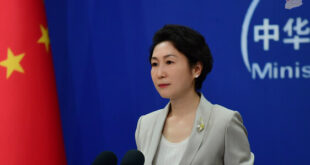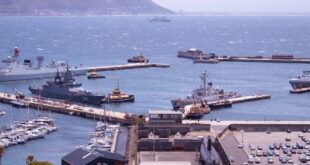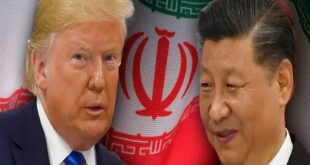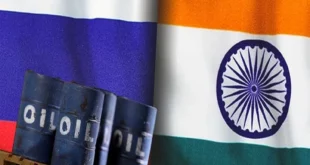In the increasingly bitter global rivalry between China and the United States, the case of Venezuela’s special envoy, Alex Saab, may be only a sideshow. But it serves as a good reminder of the different political and diplomatic priorities of the two superpowers as they vie for influence in major regions around the world, including West Africa.
Saab, a Colombian businessman and close ally of beleaguered Venezuelan President Nicolas Maduro, is not as well-known as Belarusian dissident journalist Roman Protasevich. That says something about the extraordinary double standards of the mainstream western media. The circumstances of their arrests are not only remarkably similar, Saab’s case is arguably even more outrageous. But since the abuser of power is not Belarus, but the United States, international press coverage has been scant and criticism virtually non-existent.
Washington and western governments, of course, have been shouting from the rooftop about Protasevich who was arrested in Minsk after his plane was forced to land in May by the Belarusian air force, which claimed speciously about a bomb threat.
However, they have kept a deafening silence as the US seeks to extradite Saab, who has been detained in the island nation of Cape Verde, off the coast of West Africa, since last June. At the time, under US pressure, neighbouring African countries reportedly denied landing to his plane for refuelling, so it was forced to land in Cape Verde. He was on route to Iran reportedly to exchange Venezuelan gold for fuel and medicine as both countries are under crippling US sanctions. Swiss bank UBS, for instance, has blocked Venezuelan payment to the international COVAX vaccine-sharing facility for fear of breaching US sanctions.
Washington has charged Saab with money-laundering and violating unilateral US sanctions. Caracas has argued, not unreasonably, that he has full diplomatic immunity. Both the United Nations’ Human Rights Committee and the Economic Community of West African States Court of Justice have demanded his release. His case is now before Cape Verde’s top court, the Constitutional Court.
Despite China’s competing influence with the US in Cape Verde, Beijing and Chinese state-run news media have kept mostly mum about Saab. Had the case been reversed, Washington would, without doubt, be screaming bloody murder about illegal detention, kidnapping and human rights violations. Chinese diplomats prefer not to play that game.
But why not? Though the former Portuguese colony is only a small nation with a population of around 550,000, China has already helped it to build a presidential palace, a large government compound and a football stadium, and is funding a US$60 million expansion of a university this year. This is against the backdrop of a US$400m package, so far uncommitted, that Washington has been dangling before Cabo Verde, including building a huge US diplomatic compound.
Roughly 570 km off the west coast of the African continent, in the heart of the Atlantic Ocean, Cape Verde is an important sea and air-refuelling site. Securing access to the archipelago will be a major geopolitical win for either Washington or Beijing.
Unsurprisingly, the US has long entertained establishing a military base there. In 2018, the US central military command for Africa (Africom) hosted its annual conference in Cape Verde. However, the country’s constitution prohibits the installation of any foreign military base. China, obviously, has comparable geopolitical and commercial interests.
Saab’s case has thrown a spanner into this complicated diplomatic dance. Cape Verde does not want to be seen as doing Washington’s bidding but needs to remain in its good graces. Washington wants to maintain a veneer of legality even though its case against Saab is clearly motivated, from day one, by its sustained campaign to bring down the Maduro government, efforts which include siding with Maduro’s nemesis and opposition leader Juan Guaido. There have been allegations that Cape Verde’s Attorney General, Luís José Landim, is close to US interests dating back to the time when he served as a public prosecutor in East Timor (or Timor-Leste), another former Portuguese colony. Beijing is friendly with Maduro and wants him to stay in office.
Meanwhile, the representatives of Maduro and Guaido have been negotiating in Mexico City through the mediation of the government of Norway. Progress has been made but Saab’s case remains a major obstacle to any deal in which Washington will have a major stake. One reason is that Guaido’s faction has been fracturing, despite western support; and the Venezuelan economy has been improving, despite US sanctions. That will significantly boost Maduro and his United Socialist Party’s chances in the upcoming national elections in November.
Given all these complex factors, the outcome of Saab’s extradition case has been the wild card. He has been Maduro’s most important fixer and dealmaker. Beijing may well have an incentive to call attention to the injustice of this case, which is typical of the extrajudicial overreach of the US, something that has long irked the Chinese, among many others. After all, it has many similarities to the ongoing US extradition case against Meng Wanzhou, the Chinese telecom giant Huawei’s chief financial officer and its founder’s daughter, in Canada.
Despite US charges claiming bank fraud and contravention of US sanctions against Iran with which a company of Meng tried to do business, her case was clearly part of Washington’s campaign to destroy the 5G pioneer and one of China’s key national champions in the hi-tech space. It came after the US jailing of former Hong Kong home secretary Patrick Ho Chi-ping for bribery and money laundering, in a case involving his promotion of China’s Belt and Road Initiative, a global infrastructure aid and cooperation programme, in Chad and Uganda.
Self-described as “the first of the sacrificial lambs” in the US trade war with China, Ho’s dealings in Africa did not involve American interests in any way. But Washington was able to target him because some financial transactions were made in the US.Despite such irritants, many things are currently going in Beijing’s favour, in Venezuela and elsewhere, as the US is distracted and discredited over its disastrous withdrawal from Afghanistan. It may not want to overplay its hand in Cape Verde.
 Eurasia Press & News
Eurasia Press & News



